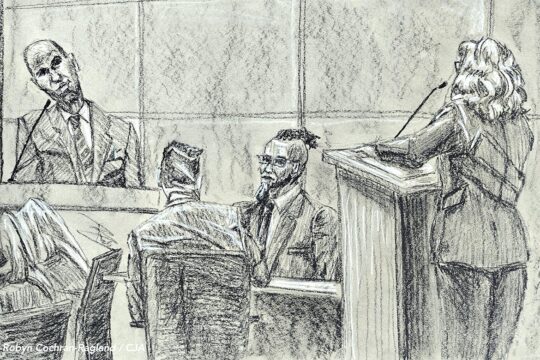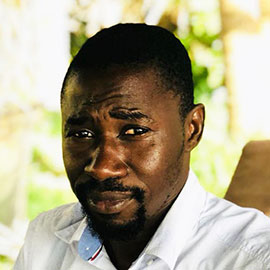In anger, Gambian students marched into the streets on April 10 and 11, 2000. During the protest, fourteen of them were shot dead and dozens injured with gunshot wounds. This was prompted by the killing of Ebrima Barry and the raping of Binta Manneh, allegedly by members of the security forces. Binta was a 15-year old student who was reportedly raped by a paramilitary officer near the Independence Stadium in Bakau, near Banjul. Ebrima was a 19-year old student who was reportedly beaten to death by members of the Gambia Fire and Rescue Services. No one has been held responsible or punished for both crimes.
On the day of the protest, several wounded people were on the floor, struggling with complications from gunshot wounds at the country’s main hospital, Edward Francis Small Teaching Hospital (EFSTH). Among the most critically injured who were hospitalized were Sainey Senghore, Assan Suwareh, Yusupha Mbaye and Oumie Jagne. Mbaye was shot on his spinal cord, a wound that would eventually confine him to a wheelchair. He recalled how he was maltreated by nurses at the Intensive Care Unit of the hospital with three other colleagues, including a 3-year old kid, Musa Semben, who was also hit by a stray bullet. Musa would later be taken to Senegal for treatment – at the expense of his father – and die two months later. Senghore, who was shot at his leg, stayed two months at hospital. After a month, he told JusticeInfo.net, he developed gangrene. Jagne still has a bullet fragment in her hand.
The victims’ frustration at the hospital has been summed up by Oumie Jagne. She told Gambia’s Truth, Reconciliation and Reparations Commission (TRRC) that she refused to have an exchange with the president Jammeh when he visited the hospital. “My sister was insulting his [Jammeh’s] mother and he turned his back on us, laughing,” said Jagne. When asked why she did not want to see Jammeh, Jagne said it was because he was the one who had ordered the shootings.
“It was out of fear that I complied with orders”
The shooting shocked the small nation of less than 2 million people. But little was known about the people who participated in it. This just began to change before the TRRC.
Last Thursday, on September 19, Dr Mariatou Jallow came to testify before the TRRC. In April 2000, she was the chief executive officer of the main hospital, the EFSTH. She had studied in Ghana and Canada and would held several top positions in Gambia’s health departments. In 2008, she would even become the most powerful voice in the country’s health sector when she was appointed minister of Health. She recalled that the victims “were not happy” at seeing Jammeh at the hospital. Then she admitted that while treatment abroad was recommended for some victims of the army shooting, she actually seized the medical records of the students, an act that prevented them to travel.
“I was ordered by State House not to give these wounded students their medical records. That was not normal. I accept that it was wrong,” Dr Jallow confessed. To comply with the executive order, she told the records office and nurses at the hospital not to give the student victims their papers. But she fell short of naming the person who reached out to her from the Office of the President. She only said the person was a protocol officer.
- It was out of fear that I complied with orders from State House. If I did not agree, anything could have happened to me, Mariatou Jallow said.
- You took their medical papers from them? asked the TRRC lead counsel, Essa Faal.
- Yes, I did.
- You know they needed this document if they were to go for abroad treatment.
- Yes, I knew, said Jallow, in a submissive tone.
A brief silence followed.
- We want to know what made you do it, continued Faal.
- We were under a dictatorship and knowing that I could be imprisoned or something bad could happen to me if I was on the bad side of the ex-president [Yahya Jammeh].
- So, you violated their rights and carried out an illegal order.
- Yes, I did.
“I have failed them, the nation has failed them”
The state eventually approved for the abroad treatment of three of the victims, Sainey Senghore, Assan Suwareh, and Yusupha Mbaye. A couple of weeks ago, Senghore told the TRRC that they were abandoned in Egypt to fend for themselves, after Gambia’s government only paid one month of their medical bill. He told the Commission that their two months medical bill was eventually paid by an Egyptian doctor.
Dr Jallow could not recall how much time the victims had spent at Cairo’s El Agouza Hospital. But she did recall how she, again, took the medical papers from the three students upon their return from Egypt – this time straight at the airport.
- What do you have to say to these young people? asked Faal.
- I would say to them that I have failed them. The nation has failed them for sending them for treatment and not paying for their bills. As I said earlier, we were living under abnormal circumstances, said Dr Jallow.
Some of the student victims now seem to think that she was a victim of circumstances. Senghore told JusticeInfo.net that she was a good person. “She was a good person. I think it was the situation that made her do what she did – taking our medical reports from us,” said Senghore. Another victim of the student protest, Abdou Karim Jammeh, who was hospitalized for four months after being shot at his right leg, also remembered Dr Jallow as a “kind lady”. “She was afraid and she was under pressure,” said Jammeh who now uses a walking stick.


![Dr. Mariatou Jallow explained to the TRRC on September 19 why she had confiscated the medical records of students wounded by gunshots: « We were under a dictatorship... something bad could happen to me if I was on the bad side of the ex-president [Yahya Jammeh] ». Gambia: I betrayed the students injured by gunshots, confesses Dr Jallow](https://www.justiceinfo.net/wp-content/uploads/81833be64abdc1d623c9eb523b2aa38c-730x487.jpg)




